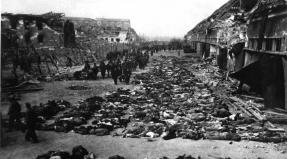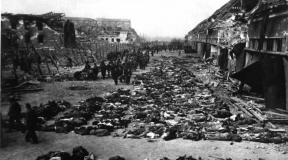Muhammad's flight from Mecca to Medina. How did the Prophet (ﷺ) migrate from Mecca to Medina?
The lexical meaning of the word “hijra” is relocation from one place to another. In Islamic theology, this term refers to the migration of the Prophet Muhammad (peace and blessings of Allah be upon him) from Mecca to Medina, which occurred in 622 according to the Gregorian calendar. The same term is used to refer to the resettlement of an Islamic group or community oppressed on religious grounds.
Hijra in Islamic history
The first Muslim community to exist in the city of Mecca experienced great difficulty in practicing its religion as a result of systemic oppression by the pagan majority. During the Hajj in 622, 75 Muslims from Medina arrived in Mecca. They accepted Islam from Musab bin Umair, whom the prophet had sent to the future capital of the Muslim state a year earlier in order to spread Islam. 75 Medina Muslims secretly met with the prophet near the town of Aqaba, where they swore an oath to the prophet and pledged to protect him and all his followers just as they protect themselves and their families. This was the second oath of Aqaba, called the “oath of war,” since the Medina Muslims promised to defend the interests of the Islamic community, including through weapons. The oath given to the prophet a year earlier by a group of Muslims consisting of 12 people is called the “oath of women”, since during this oath the Medinans promised to observe the precepts of Islam, but did not dare to defend the prophet, fearing confrontation from their fellow tribesmen, professed pagan cults. It was after the second oath at Aqaba that the Prophet Muhammad (peace and blessings of Allah be upon him) came to the decision, together with all members of the Muslim community of Mecca, to move to the city of Medina. The Prophet, turning to his followers, announced: “I was shown the place of your resettlement, it is near an oasis located between two mountains.” Thus, the prophet gave permission for the migration to take place. The second oath of Aqaba was given to the prophet in the last month of Dhul-Hijjah of the 12th year of his prophetic mission. From the next month of Muharram (July 622) the resettlement of Muslims began.
Residents of Mecca of the Islamic faith, when moving to Medina, were forced to leave all their property, wealth, houses, relatives and friends. All this was done so that the teachings of Islam would triumph. The Muslims who migrated from Mecca were called "Muhajirs" by the people of Medina - migrants. The Muslims of the city of Medina, who met and sheltered the Meccan settlers, were called “Ansars” - helpers. The Muhajirs and Ansars are often mentioned in the Qur'an.
During the months of Muharram and Safar, Muslims and their families left Mecca. They left Mecca secretly, in small groups. Meccan settlers settled en masse in a village called "Awali" on the outskirts of Medina.
The brave companion of the prophet Umar (may Allah be pleased with him) refused to leave Mecca secretly, hanging his sword on his shoulder, he began to make a ritual circumambulation around the Kaaba. While making his rounds, he addressed the polytheists in a loud voice, saying: “Here I am leaving for Medina. If anyone wants his mother to shed tears for him, if anyone wants to leave their wives widows and their children orphans, let him persecute me.” Umar moved to Medina 15 days before the prophet moved.
In a short period, Muslims left Mecca. The Prophet left with him only Abu Bakr and Ali. When Abu Bakr asked the prophet for permission to move, the prophet answered him this way: “Do not rush, Allah will give you a good companion.” Also, in addition to the prophet, Abu Bakr and Ali, those who were unable to migrate remained in Mecca. These were Muslims, forcibly kept by members of their family under house arrest, so that they would not leave them with the prophet, as well as male and female slaves. At that time, the prophet was in a very dangerous position.
Relocation of the Prophet

A) Treaty of Dar-an-Nadwa
As a result of the two oaths given at Aqaba, the intensive spread of the new Islamic faith began in Medina, which greatly concerned the pagans. The resettlement carried out by Muslims at that time also added fuel to the fire. The pagans understood that if the Prophet Muhammad (peace and blessings of Allah be upon him) was able to leave Mecca to go to Medina, he would certainly lead the growing Muslim community. The fact is that the caravan route leading from Mecca to Syria passed through Medina. Naturally, the Meccan nobility did not want this important point, from the point of view of trade, to be controlled by people “who had betrayed the religion of their fathers.” They also feared that due to all the years of oppression and oppression committed against Muslims in Mecca, the Muslims, having gathered forces, might take revenge on them. The heads of the Quraish tribe, realizing the seriousness of the situation, gathered in the town of Dar an-Nadwa in order to decide what to do with Muhammad (peace and blessings of Allah be upon him) who remained in Mecca at that time. The most suitable proposal, according to those gathered, came from the main enemy of the prophet Abu Jahl. He told the crowd: “We will choose one representative from each clan of the Quraish tribe. They will simultaneously strike with their swords against Muhammad and kill him. So, no one will know who actually killed Muhammad, from whose blow he died. Thus, the blood of Muhammad will be divided among all clans; the Hashemites will not be able to take revenge on all clans for the blood of their relative. They will be forced to agree to pay compensation for the blood shed. This is how we will resolve this issue.” All those present accepted Abu Jahl's proposal. To carry out the planned murder, 40 fighters were trained, representatives of all clans of the Quraish tribe.
B) The Prophet is surrounded
Angel Gabriel knowingly informed the prophet about the plans of the polytheists. “Today you will not lie down on your bed, today you will leave your home,” said the angel. Thus, the prophet was also allowed to migrate. The Prophet called Ali to him and told him: “I am going to Medina. Tonight lie down on my bed, cover yourself with my blanket. Let the polytheists think that I am lying in bed, do not give yourself away, then immediately go to Medina.”
According to the plan, the chosen murderers of the Quraish tribe surrounded the house of the prophet. They planned to attack the prophet in the morning when he left his house. Ali lay down on the prophet's bed. At that moment, the Prophet took a handful of sand into his palm and, going around his home, sprinkled this sand on the polytheists who surrounded his house. Each of the killers was hit by grains of sand sprinkled by the palm of the blessed Messenger of Allah. They all fell into a deep sleep. At the same time, the prophet read the first 9 verses of Surah Yasin, where there are words with the following meaning: “And We built a wall in front of them and behind them, surrounded them with a curtain, and they do not see.” So the prophet passed among the polytheists who had fallen asleep on their mission. Morning came, the Quraish fighters were firmly convinced that their victim was in their hands. Without waiting for the prophet to leave the house, they broke into the home of the noble Messenger of Allah in order to carry out their vile plan. But then the Meccan “special forces” were in for a surprise; instead of Muhammad, his cousin Ali was in bed. There was no limit to the indignation of the polytheists. They searched the entire house, but found no one. They walked all over Mecca, but Muhammad was nowhere to be found.
Enraged enemies of Islam announced a reward of 100 camels for anyone who caught Muhammad. This news instantly spread throughout all the streets of Mecca. All the hired killers, trackers, and just adventurers immediately jumped out of their seats and rushed to search for Muhammad, who managed to unnoticed escape from the dense ring of encirclement. The search took place both in the city and beyond.
After the prophet calmly left the encirclement, he headed to the holy Kaaba under the cover of the Arabian night. After performing the ritual circumambulation of the Kaaba, he addressed his hometown, saying: “O Mecca, you are the best place before Allah on this earth, and the most beloved place for me. If I had not been forced to leave you, I would never have done this.” At noon of the following day, he came to Abu Bakr’s house and announced that they, with the permission of Allah, would go to Medina. Abu Bakr, not holding back tears of joy, pointing to two camels, which he had not let out for 4 months and fed them with tree leaves, said: “Choose whichever you want, O Messenger of Allah.”

B) Two in a cave
After waiting until nightfall, they went out through the back window and, taking off their shoes on their toes, proceeded to the southern part of the city. Having covered 3 miles in an hour and a half, they reached Mount Saur and settled in a cave located at the top of this mountain. They hid in this cave for 3 days (from the night of Thursday to Friday until Sunday) until the search for their capture ended. Abu Bakr's son Abdullah visited them at night and reported on the situation in Mecca. Abu Bakr's servant Amr bin Fuhaira, who tended sheep, came to Mount Saur in the evenings and brought milk to the prophet and his companion.
The rangers who were looking for the prophet and Abu Bakr, following their tracks, came to the entrance to the cave. Footsteps and conversations of the pursuers could be heard in the cave. Abu Bakr, raising his head, saw their feet and excitedly said to the prophet: “O Messenger of Allah! If they bend down, they will see us.” To which the prophet replied: “Do not be afraid, Allah will help us.” The pursuers looked at the entrance to the cave and saw that a spider had made a web and one white dove had made a nest and was hatching eggs. The Quraysh, deciding that inspecting the cave in this case was pointless, turned back.
The fact that the prophet set out on his journey was learned in Medina. The people of Medin left the city every morning and waited for the prophet to come. On 12 Rabiul-Awwal/23 September 622, the Muslims of Medina also went outside the city to meet the prophet. The wait was interrupted by the heat of the afternoon, causing Muhammad's followers to return to their homes. At that moment, one of the Jews went up to the roof of his house to do his business and saw in the distance two camel riders dressed in white robes. He exclaimed: “Oh, you who watched the road all day long in anticipation! The one you’ve been waiting for is coming!”
Arrival in Medina

A) Prophet in Cube
According to the ancient custom that existed in Medina, if any celebration or holiday took place, all residents put on weapons. The long-awaited arrival of the Prophet Muhammad in Medina was a truly great event for the long-suffering Islamic community. Therefore, the people of Medina, having heard the good news, immediately put on their weapons and went to meet the prophet. Muslims met the prophet in the village of Quba, an hour's journey from Medina. The Prophet founded the first mosque in the history of Islam in Quba, where he and his followers prayed.
B) First Friday prayer
14 days after arriving in Cuba, the Prophet Muhammad, on Friday, mounted a camel and, together with the Muslims who met him, headed towards Medina. By lunchtime they reached the "Ranuna" valley, which belonged to the sons of Salim bin Auf. The Prophet Muhammad, having read 2 sermons here one after another, performed the first Friday prayer in the history of Islam together with believers.
B) Medina meets the prophet
After performing Friday prayers, the prophet continued his journey to Medina. On this day, Medina experienced the greatest day in its history. The arrival of the prophet became a real holiday for Muslims. Crowds of people filled the entire road running from the village of Quba to Medina itself. Women read poetry, children's voices pierced the hot air of the Arab city with loud exclamations: “The Messenger of Allah has come!”, little girls had fun, striking tambourines. Never before have the people of Medina rejoiced as much as they do now. The whole of Medina literally rejoiced that the Messenger of Allah himself became one of its inhabitants.
The role of the Hijra in Islamic history

“Hijra” saved Muslims from oppression and oppression of pagans, Islam gained the opportunity to spread, “Hijra” marked the beginning of the birth of a Muslim state. 17 years after the “Hijra”, during the reign of the righteous caliph Umar, the date of the migration of the Prophet Muhammad from Mecca to Medina was accepted as the starting point of lunar chronology. This chronology in Arabic is called by the name of the event that happened, that is, “Hijri”.
Prophet Muhammad moved to Medina in the 13th year of his prophecy on 12 Rabiul-Awwal/23 September 622. At that time, the prophet was 53 years old.
Is “hijra” obligatory today?
For every good deed performed, Allah grants a person a spiritual reward. There is no doubt that a person who migrates for the sake of Allah Almighty is also worthy of a great reward. Allah said in the Quran: “Those who believed, migrated and fought in the path of Allah with their property and their souls are superior to Allah. They are successful” (Tauba 20). “Allah is pleased with the first of the Muhajirs and Ansars who were ahead of the rest, and with those who followed strictly behind them. They are also pleased with Allah. He prepared for them Gardens of Eden in which rivers flow. They will remain there forever. This is great prosperity” (Tauba 100). “Those who migrated for the sake of Allah after being oppressed, We will give them a wonderful home in this world, and the reward in the Hereafter will be even greater. If only they knew” (Nahl 41).
Amr bin al-As turned to the prophet, saying: “O Messenger of Allah! I am ready to give you an oath on the condition that all my sins committed before will be forgiven.” To this the Messenger of Allah replied: “O Amr! Don’t you really know that Allah forgives all sins of those who embrace Islam?! Also Hijra and Hajj. Whoever commits them, Allah will forgive him all his previous sins.”
Allah is the only true creator of all things. Allah created this world for man and subordinated to him what is on this earth. Man was created by Allah so that he could worship Him and live on this earth according to His laws.
Allah says about this in the Koran: “O My believing servants! Verily, My land is vast, so worship Me! (Ankabut 56).
This verse was revealed regarding Muslims who lived in Mecca and did not have the opportunity to openly practice their religion.
Prophet Muhammad (peace and blessings of Allaah be upon him) said: “All kingdoms belong to Allah. All slaves belong to Allah. So settle where there is good for you. (İbn Kesîr Tefsirü"l-Kur"âni"l Azim II14).
All people are slaves of Allah, and the entire earth with all its sides belongs only to Allah. The earth is so vast that it can accommodate all the people that Allah has placed on it. Accordingly, if in the territory where Muslims live, members of the Islamic community are oppressed on religious grounds, they do not have the opportunity to worship Allah, perform their religious rituals, or they are forced to accept a different faith, in this case this territory is considered unsuitable for believers to live in. Muslims In this case, Muslims must find a more comfortable place to live. The most preferred place of residence for a Muslim is the area where he can freely worship Allah Almighty.
Every person loves his homeland, because he was born here, grew up, his relatives are here, his property, work and many things that connect him with his native land. But be that as it may, a Muslim must live where he can freely practice his religion.
“If a Muslim cannot worship the one Allah in his place of residence, or he experiences any difficulties in the practice of religious worship, in this case he needs to leave this area and move to a place where there is freedom of religion. The main task of a Muslim is to worship Allah, for this purpose he must make every effort to perform hijra to a place where he can fulfill his religious duties” (Elmalı U.H. Y. Hak Dinî Kur"ân Dili V 3790).
If in the territory where Muslims live, there is religious tolerance towards the Islamic religion and they are allowed to believe in Allah, build religious buildings, religious educational institutions and perform their rituals, then in this case it is NOT NECESSARY to perform hijra.
In our opinion, Russia is the most suitable place for citizens to live, including those of the Islamic faith, since Islam is not an alien ideology for Russia, but on the contrary, it is a traditional faith, whose representatives have lived on the territory of our country for centuries. Over many centuries of coexistence of various religious faiths, Russians have developed a special sense of good neighborliness and respect towards each other.
Beginning of the Muslim era
During the time elapsed from 610 to the resettlement ( Hijras) to Medina in 622, Muhammad became the recognized head of the Meccan Muslim community. The newly converted, if they came from other clans, were “adopted” by the clan of Hashim, but at the same time they became brothers-in-arms not only in the named kinship, but also in spirit. This is the origin Muslim Ummah, at first very few in number, located in the hostile environment of the Meccan clans, which, barely tolerating the Muslims, nevertheless could not destroy them, since they would have received blood enemies from the Hashemid clan.
Rich merchants, moneylenders and landowners of Mecca could not come to terms with the preaching of Muhammad, which undermined the foundations of their well-being. Muhammad condemned usury, greed, deception, and superstitions of the Meccans, warning of eternal torment to which the souls of the “unmerciful,” “weight-bearers,” “hypocrites,” and “infidels” are doomed:
...The one who sacrificed and feared and considered the most beautiful to be true, We will make the path to the easiest for him easier. And whoever was stingy and rich, and considered the most beautiful things to be lies, We will make the path to the most difficult things easier for him. And his wealth will not save him when he falls...(Quran, 92: 5-11)(1) .
The Meccans were afraid to physically eliminate Muhammad and his followers, but they could create unbearable living conditions for them. Abu Bekr, fanatically devoted to Muhammad and the cause of Islam, spent almost all of his considerable fortune on helping needy Muslims and on ransoming slaves who converted to Islam. The difficulties of existence forced some Muslims to emigrate to Ethiopia, and in 615 there were only fifty-two of them left in Mecca.
Over time, Muhammad’s enemies even achieved that a meeting of clan elders recommended that Abu Talib, the head of the Hashemids, excommunicate the troublemaker from his clan. Abu Talib did not follow this advice, guided by the right of every Arab to be under the protection of his family. In response, the Meccans in 617 excluded all Hashemids except Abu Lahab from participating in the caravan trade, which reduced them to even greater poverty. However, two years later, the same council of elders canceled the boycott, despite the machinations of Amr ibn Hisham. It was only after the death of Abu Talib in 619 (Khadija also died in the same year), when Abu Lahab took his place, that Muhammad’s position became truly dangerous. Abu Lahab could well have eventually achieved the expulsion of the Muslims.
Muhammad was forced to look for a tribe that would “adopt” his community and take Muslims under its protection. At first he tried to settle in Taif, but was met with hostility in the oasis, since the lands in Taif were owned mainly by the same Meccans. His uncle, Abbas ibn Abd Muttalib, a wealthy merchant and owner of a vineyard in Taif, came to the aid of Muhammad. He also had the right to sell water from the Zemzem well to pilgrims (he retained this privilege even after the establishment of Islam in Mecca). At that time, this uncle of the Prophet, the founder of the dynasty of Abbasid caliphs (750-1517), was not yet a Muslim and even fought on the side of the Meccans in the Battle of Badr. Abbas ibn Abd Muttalib acted as a mediator in the negotiations between Muhammad and the tribes from Yathrib. The Greeks called this oasis Yathrippa, and since Islam it has been known as Medina (city). Later, Muslims gave the name of the city a new meaning - Madinat an-Nabi ("City of the Messenger of Allah of both worlds").
At the beginning of the 7th century, Medina was an agricultural oasis with arable land, gardens and vineyards. There were five tribal settlements in the oasis: two Arab, Aus and Khazraj, and three Jewish. The pagan tribes of Yathrib were in a state of brutal internecine war, which threatened them with mutual destruction. Twice, in 620 and 622, in the desert area of Aqaba, meetings between Muhammad and his closest associates took place with representatives of these tribes. An agreement was concluded between them and Muhammad, sealed by an oath of brotherhood between Muslims, Ausites and Khazrajites. Thus, the next important step was taken on the Arabs' path to the ummah: the Muslim community expanded into an intertribal union, and unity in spirit became dominant over unity in blood.
As a result of all these preparations, in the summer of 622, about seventy Muslims from Mecca went to Medina. Among the first settlers was Umar. Muhammad, Abu Bekr and Ali were the last to leave. By this time, the enemies of the Muslims decided to elect one representative from each Meccan clan so that they would jointly kill Muhammad. Then the Hashemids would be unable to avenge him and would inevitably be satisfied with a monetary ransom for the murdered man. Ali, who became aware of the plot, warned Muhammad. Muhammad and Abu Bekr managed to leave Mecca unnoticed. For some time they hid in the surrounding mountains:
If you do not help him, then Allah helped him. So those who did not believe drove him out when he was the second of the two. Here they were both in the cave, and he said to his companion: “Do not be sad, because Allah is with us!” And Allah sent down His peace on it and reinforced it with troops that you did not see, and made the word of those who did not believe inferior, while the word of Allah is highest: verily, Allah is mighty, wise!(Quran, 9:40)(2) .
Muhammad and Abu Bekr arrived in Medina on September 4, 622. A description of Muhammad’s appearance has been preserved, given by an eyewitness to his appearance in Yasrib: “He was a man of average height, slender, broad-shouldered; thick curly hair, a long black beard, a large head, an open forehead, black arches of eyebrows fused at the bridge of the nose, long eyelashes, more shiny eyes , hooked nose; bold, heavy gait."
Muhammad chose the place where his camel stopped. The first mosque was built here ( masjid) - a simple building next to the equally simple dwelling of the Prophet. Hours for daily prayers were set. Responsibilities imam, the leader of the Prayer, was performed by Muhammad, Abu Bekr or Umar. The first one was appointed muezzin(lit.: “to shout from the minaret”) - Abyssinian Bilal. He said adhan- call of believers to prayer. Thus, in strict accordance with the orders and prohibitions of Allah, the ritual side of Islam began to take shape.
An authentic document of that time has been preserved - the charter of the Medina Muslim community, from which it is clear that Muhammad, being the religious head of the community, at the same time, in modern terms, was also its political head. This was the innovation that was not in din al-arab. All the inhabitants of Medina, Muslims, Jews and pagans, were treated as one, and each of them enjoyed equal rights, regardless of tribal or religious affiliation. The new legislation was formed on the basis of revelations, the content of which did not always coincide with one or another custom: the person who committed the murder should not be protected by any of the tribes of the union; enmity and blood feud between members of the Medina community were not allowed; all disputes were resolved by Muhammad, guided by the supreme will of Allah. At the same time, the tribes remained independent, could communicate with each other, and enter into agreements with any other tribes outside Medina, except for the Quraish of Mecca, who were considered enemies. In general, the Muslim community sought recognition of its status equal to that of any other tribe in Arabia.
The migration of the first Muslims to Medina was called Hijras. Those Muslims who migrated with Muhammad became known as muhajirs- migrants. The title of muhajir has since become very honorable. Later, Muslims who migrated from Muslim countries conquered by non-Muslims, such as Christians, will also be called Muhajirs. From that time on, the inhabitants of Medina who converted to Islam were called Ansars- assistants.
Sixteen years later, the epochal event of the Hijra was recognized as marking the first year of the Muslim era. According to the Arab calendar, it begins on the first day of the first month of Muharram of the lunar year, which corresponds to July 16, 622. A new calendar was introduced under Caliph Umar, at the suggestion of Ali. It must be said that before the Islamic era, the Arabs used a solar calendar. In the tenth year of the Hijri, Muhammad introduced a lunar year without intercalary days, consisting of 354 days, with the number of days in a month from 29 to 30. The Koran says about the lunar year:
Verily, the number of months with Allah is twelve months in the Scripture of Allah on the day He created the heavens and the earth. Of these, four are forbidden, this is a persistent religion: do not harm yourselves in them and fight all the polytheists, as they all fight you. And know that Allah is with the God-fearing! The insertion of days is only an increase in unbelief; Those who do not believe are mistaken in this; they allow it one year and forbid it in another, in order to harmonize with the account that Allah has forbidden. And they permit what Allah has forbidden. The evil of their deeds is painted before them, but Allah guides the infidel people!(Quran, 9:36-37)(3) .
Thus, for Muslims, the same month in each subsequent year begins a little earlier than in the previous one. For example, the month of Ramadan 1387 AH began on December 3, 1967, and since the Muslim year is 11 days shorter than the Gregorian year, the next month of Ramadan began on November 22, 1968. The Muslim months do not correspond to the seasons, but after 33 years they come full circle. Months are divided into weeks of seven days, which are indicated by numbers and do not have special names. Friday is the day of common prayer, the week begins with it, the day begins at sunset. There are special tables for converting dates from one calendar to another. But the lunar calendar is not entirely convenient in a world where states with different chronology systems actively interact. Therefore, Muslims begin to use the European Gregorian calendar specifically for everyday needs. At the same time, in Iran and Afghanistan, solar years are counted from the Hijra of Muhammad in 622. And all the main events in the history of Islam up to the 19th century are dated by Muslim historians according to the Hijri era.
| |
On September 20, 622, the migration (hijra) of Muhammad and his followers from Mecca to Medina took place. One of the greatest holidays of Islam is Hijri Night. This commemorates the migration of the Prophet Muhammad from Mecca to Medina. That night, Muhammad and Abu Bakr, leaving the prophet’s native Mecca, reached Medina, where by that time a Muslim community had formed. After this, the Islamic religion became known throughout the world, spreading to all corners of the earth.
Today, Muslims around the world remember the event that the righteous caliph Omar ibn al-Khattab marked the beginning of the Islamic calendar. This marked the beginning of the era of Islam.
From the very first day of Islamic preaching, Muhammad and his supporters were persecuted with malice by his unconverted fellow tribesmen. And after the Quraysh (the ruling tribe of ancient Mecca; the prophet Muhammad came from the merchants of this tribe) learned that the prophet had entered into an agreement with the inhabitants of the city of Yathrib, and the number of Muslims among them grew, the situation around Muhammad, who was living in Mecca at that time, became completely intolerant.
The fact is that the elders of Yathrib invited the Muslim prophet to move to them and lead them. In Yathrib at that time there lived Jews and Arabs who were constantly at war with each other, but both of them hoped that the reign of Muhammad would end the endless strife and bring the long-awaited peace. This happened in the thirteenth year of the prophet’s preaching.
Since then, Muhammad and his fellow believers were oppressed in Mecca to such an extent that they were forbidden to preach, call people to Islam, and openly pray near the Kaaba. Muslims were mocked and humiliated so much that in the end, supporters of Islam asked Muhammad to allow them to leave their hometown and move to a region where they would be spared persecution, stoning, and attempts to exterminate them from the world. The Prophet Muhammad agreed with their arguments and pointed them to Yathrib, a city that soon received the name Madinat al-Nabi, that is, the city of the Prophet or simply Medina.
The ashabs (supporters of the Prophet Muhammad) began to prepare for resettlement. Fearing the pagans, they were forced to move to Medina secretly. The Askhabs left their native, but such an unkind city, under the cover of darkness and in small groups, not caring about their property. Muhammad's supporters took with them only the most essential things: they were not chasing an easy life when they moved to Yathrib, but only wanting to pray and preach Islam without hindrance.
But not everyone left quietly. For example, the closest companion of Muhammad, the second righteous caliph Omar ibn al-Khattab, known for courage and strength, at the height of the day, in front of many pagans, walked around the Kaaba seven times, offered a prayer to the One God and addressed the crowd of polytheists looking at him with the following speech: “Whoever wants to leave his mother without a son, whoever wants to leave his child orphaned, whoever wants to make his wife a widow, let him try to prevent me from making Hijra” (that is, “migration”).
Little by little, all Muslims left Mecca, except for Muhammad himself, the first caliph and father-in-law of the prophet Abu Bakr, whose daughter Aisha he was married to, Muhammad's cousin and son-in-law Ali, and a few Muslims who could not leave the city due to poor health. The prophet himself asked Abu Bakr to stay with him, awaiting Allah's command for his own resettlement.
Four months have passed. While the prophet and his closest companions remained in Mecca, the Muslim community grew in Medina. A brotherhood was created between the Muhajirs, as the settlers from Mecca were called, and the Ansars, the Muslims of Medina.
But for the pagans surrounded by the Prophet Muhammad, the growth and strengthening of Islam in Medina was like a sharp knife to the heart. Realizing that the heart of Islamic preaching is Muhammad, they met in council and sentenced the prophet to death. It was a cunning plan: not just one person had to kill Muhammad, but one representative of each clan of the city of Mecca. And so that the family of the prophet could not take revenge according to the law of blood feud, all the killers had to strike Muhammad at the same time.
According to Muslim tradition, Allah revealed to Muhammad the evil intent of the pagans by sending the angel Jibril to him. At the same time, the Almighty ordered his prophet to perform the hijra that same night. Muhammad and Abu Bakr immediately left their native Mecca. Only Ali remained in the city, who had to return the property entrusted to him for safekeeping - it was he who met the killers who came after the soul of the Prophet Muhammad.
But they didn't need Ali's head. Having learned that Muhammad, following his co-religionists, performed the hijra, the enraged pagans rushed in pursuit. Muhammad did not have time to go far, and in order to hide from his pursuers, he had to spend three days in the Savr cave not far from the abandoned Mecca. The fugitives experienced terrible moments when the killers reached the cave and were literally on the threshold... but the Almighty darkened their eyes and minds: it didn’t even occur to anyone to look inside.
“Immediately Jibril (a.s.) appeared and said: “Oh, Muhammad! Allah Almighty commands you to leave Mecca and move to Medina."
Allah Almighty says in the Quran:
“So the unbelievers contrived to imprison, kill or expel you. They were cunning, and Allah was cunning, and Allah is the Best of cunning” (Surah “Prey”, verse 30).
Many mufassirs give such a story.
“There was one house in Mecca called Darun-Nadwa.” One day, four mushriks entered this house to discuss how to ambush the Prophet Muhammad (peace be upon him) and kill him. Iblis wormed his way among them. Abu Jahil ordered him to leave this house. But Iblis objected:
“I came here from the country of Najid. I have lived a long life, and therefore I can foresee everything. I want to stay with you and tell you something.
Abu Jahil and his companions said:
“Since you have come from Najid, stay with us and sit here.”
Utba took the floor:
“His death will solve all our problems.” When Muhammad (peace be upon him) dies, we will be free from his evil and he will no longer be able to harm us.
Iblis intervened in the conversation:
“This is a wrong judgment,” he said.
Sheiba took the floor:
“I propose to imprison him and let him die of hunger there.”
“This is also wrong,” said Iblis.
After this, As bin Wail spoke:
- Let's tie Muhammad (peace be upon him) to a camel and leave him in the desert. Let him die there,” he suggested.
“This is also not suitable,” said Iblis.
Then Abu Jahil spoke:
“Let's gather the best guys from each tribe and attack Muhammad one night.” We will all hit him with our swords together, so that it will not even be possible to establish who exactly killed him. If his loved ones demand a ransom, we will all collect the money and give it back. This way we will get rid of his evil.
“Well said,” Iblis approved.
Everyone agreed to kill the Prophet (peace be upon him), coming to a common decision. After that they left that house.
Immediately Jibril (a.s.) appeared and said:
- Oh, Muhammad! Allah Almighty commands you to leave Mecca and move to Medina. I still have one secret business here. This night you will lie in your bed, but you will not sleep, so Allah commands.
When night fell, the Prophet (peace be upon him) gathered his companions to consult.
- Which of you will go with me to Medina? he asked.
Abu Bakr al-Siddiq (r.g.) said:
- O Messenger of Allah! Wherever you go, I will go with you.
After this, the Prophet (peace be upon him) looked at the Sahabah and asked:
“Whoever of you lies in my bed this night, I guarantee that he will enter Paradise.”
Hazrati Ali (r.g.) stated:
“I am ready to sacrifice my life on your path.” This night I will lie in your bed.
At night, the unbelievers surrounded the house of the Prophet (peace be upon him) and sat and waited. Iblis was also with them. The Almighty sent them into a deep sleep, even Iblis fell asleep. The Prophet (peace be upon him) together with Abu Bakr (r.g.) left the house, then took a handful of earth, scattered it over them and read Surah Yasin.
From the book “Anvarul Ashikyn”

Read also:

Are we not alone in this world?
Throughout history, humanity has been attracted to the supernatural. Spirits, ghosts and many other creatures have filled our minds and captured our imaginations. Do these spirits really exist? Are they more than just a figment of our imagination and an illusion?

Artificial termination of pregnancy is the greatest sin
Currently, artificial abortion has struck our society like a contagious disease. Some of our compatriots don’t even think about how harmful it is to health and is extremely negatively perceived by the public. Committing this act is a grave sin among representatives of various faiths

“La ilaha illAllah” consists of four words, what is the meaning of this?
Question: “La ilaha illAllah” consists of four words, what is the meaning of this? Answer: Some scholars are of the following opinion: half the middle of the day and night is four hours, and these four words spoken during these four hours can cause the acceptance of any request from the Creator. Whoever mentions these four words both night and day will receive forgiveness from the Almighty. According to others, the four words are equal to the number of angels carrying them. Some associate this with the fact that the one who speaks these four words sincerely from the heart will be completely cleansed of sins.

I accepted Islam. What's next?
The first years after pronouncing the Shahada do not always go smoothly. After reading many books, contemplating and realizing that I was ready to take this step, the transition to Islam itself seemed troubling to me.


“Oh Allah, I almost sold my religion!”


Recipe for healthy hair from the Messenger of Allah (peace be upon him)
Hair care today is not only an integral part of the life of a modern person, but also an entire industry, without which the life of society is unthinkable. However, probably today, few people know that for fifteen centuries, Muslims, following the sunnah of the Messenger of Allah (peace and blessings of Allah be upon him), have been sensitive to the issue of hair care.

Dua recited on the Night of Destiny

16 phrases every Muslim should know
As Muslims, when faced with certain circumstances, we should respond to them as prescribed in Islam. There are a large number of Muslim phrases that are relevant and suitable in a particular context:
© 2018 Information and analytical federal portal “Islam Today”
Night of the Hijra: from Mecca to Medina
On September 20, 622, the migration (hijra) of Muhammad and his followers from Mecca to Medina took place. One of the greatest holidays of Islam is Hijri Night. This commemorates the migration of the Prophet Muhammad from Mecca to Medina. That night, Muhammad and Abu Bakr, leaving the prophet’s native Mecca, reached Medina, where by that time a Muslim community had formed. After this, the Islamic religion became known throughout the world, spreading to all corners of the earth.

Today, Muslims around the world remember the event that the righteous caliph Omar ibn al-Khattab marked the beginning of the Islamic calendar. This marked the beginning of the era of Islam.
From the very first day of Islamic preaching, Muhammad and his supporters were persecuted with malice by his unconverted fellow tribesmen. And after the Quraysh (the ruling tribe of ancient Mecca; the prophet Muhammad came from the merchants of this tribe) learned that the prophet had entered into an agreement with the inhabitants of the city of Yathrib, and the number of Muslims among them grew, the situation around Muhammad, who was living in Mecca at that time, became completely intolerant.
The fact is that the elders of Yathrib invited the Muslim prophet to move to them and lead them. In Yathrib at that time there lived Jews and Arabs who were constantly at war with each other, but both of them hoped that the reign of Muhammad would end the endless strife and bring the long-awaited peace. This happened in the thirteenth year of the prophet’s preaching.
Since then, Muhammad and his fellow believers were oppressed in Mecca to such an extent that they were forbidden to preach, call people to Islam, and openly pray near the Kaaba. Muslims were mocked and humiliated so much that in the end, supporters of Islam asked Muhammad to allow them to leave their hometown and move to a region where they would be spared persecution, stoning, and attempts to exterminate them from the world. The Prophet Muhammad agreed with their arguments and pointed them to Yathrib - a city that soon received the name Madinat an-Nabi, that is, the city of the Prophet or simply Medina.
The ashabs (supporters of the Prophet Muhammad) began to prepare for resettlement. Fearing the pagans, they were forced to move to Medina secretly. The Askhabs left their native, but such an unkind city, under the cover of darkness and in small groups, not caring about their property. Muhammad's supporters took with them only the most essential things: they were not chasing an easy life when they moved to Yathrib, but only wanting to pray and preach Islam without hindrance.
Read also: Muslim women demand sex heaven on earth
But not everyone left quietly. For example, the closest companion of Muhammad, the second righteous caliph Omar ibn al-Khattab, known for courage and strength, at the height of the day, in front of many pagans, walked around the Kaaba seven times, offered a prayer to the One God and addressed the crowd of polytheists looking at him with the following speech: “Whoever wants to leave his mother without a son, whoever wants to leave his child orphaned, whoever wants to make his wife a widow, let him try to prevent me from making Hijra” (that is, “migration”).
Little by little, all Muslims left Mecca, except for Muhammad himself, the first caliph and father-in-law of the prophet Abu Bakr, whose daughter Aisha he was married to, Muhammad's cousin and son-in-law Ali, and a few Muslims who could not leave the city due to poor health. The prophet himself asked Abu Bakr to stay with him, awaiting Allah's command for his own resettlement.
Four months have passed. While the prophet and his closest companions remained in Mecca, the Muslim community grew in Medina. A brotherhood was created between the Muhajirs, as the settlers from Mecca were called, and the Ansars, the Muslims of Medina.
But for the pagans surrounded by the Prophet Muhammad, the growth and strengthening of Islam in Medina was like a sharp knife to the heart. Realizing that the heart of Islamic preaching is Muhammad, they met in council and sentenced the prophet to death. It was a cunning plan: not just one person was to kill Muhammad, but one representative of each clan of the city of Mecca. And so that the family of the prophet could not take revenge according to the law of blood feud, all the killers had to strike Muhammad at the same time.
According to Muslim tradition, Allah revealed to Muhammad the evil intent of the pagans by sending the angel Jibril to him. At the same time, the Almighty ordered his prophet to perform the hijra that same night. Muhammad and Abu Bakr immediately left their native Mecca. Only Ali remained in the city, who had to return the property entrusted to him for safekeeping - it was he who met the murderers who came after the soul of the Prophet Muhammad.
But they didn't need Ali's head. Having learned that Muhammad, following his co-religionists, performed the hijra, the enraged pagans rushed in pursuit. Muhammad did not have time to go far, and in order to hide from his pursuers, he had to spend three days in the Savr cave not far from the abandoned Mecca. The fugitives experienced terrible moments when the killers reached the cave and were literally on the threshold... but the Almighty darkened their eyes and minds: it didn’t even occur to anyone to look inside.
Read also: Pilgrimage Tours: Allah's House in Mecca
Abu Bakr, fearful for the life of his prophet son-in-law, said: “If one of them looks at his feet, he will see us.” But Muhammad remained serene: “What can you say about three, one of whom is Allah.” The prophet implied that the Lord himself was with them in the cave and would definitely protect them from their opponents.
Actually, that’s what happened: the hunters for the prophetic head returned to Mecca empty-handed, but immediately announced a reward for the capture of Muhammad. They promised to give one hundred camels to someone who was luckier than them. The famous tracker and hunter Suraka ibn Nawfal took this bait. Riding a fast horse, he rushed towards the fugitives and almost overtook them. But, when Muhammad and Abu Bakr were almost in his hands, Surak’s horse suddenly began to sink in the sand as if in water. The frightened hunter asked his potential victims for help, and they pardoned the hapless killer. Muhammad called on Allah, and immediately Surak's horse was freed from captivity in the sand.
Impressed by such a miracle, Suraka believed without leaving the spot, recognized Muhammad as a prophet and, remembering his sins, prudently asked for his intercession on the Day of Judgment before Allah. Suraka proved his faith by deed: before he had time to return to the city (of course, without Muhammad), he immediately began to successfully throw off the trail of other hunters for the life of the prophet.
Meanwhile, Muhammad and Abu Bakr, having overcome all the difficulties of the journey, finally reached Medina on the 12th of the month of Rabiul-Awwal. There they were met by overjoyed companions who swore an oath of allegiance to the prophet. The preaching of Muhammad and his supporters was received much more favorably here, so Islam began to quickly spread throughout the Arabian Peninsula. And the night of Muhammad’s departure from Mecca (in 622 AD) marked the beginning of a new calendar, the lunar Muslim calendar, according to which the Muslim world still lives.
But Mecca, hostile to Muslims, did not go unpunished. In 630, members of the Medina community, led by the Prophet Muhammad, entered the city that had expelled the prophet as victors. The inhabitants of Mecca surrendered without a fight and unquestioningly agreed to accept Islam. Since then, Mecca has become a religious center, and Muslims began to pray, turning their faces towards the holy city.
Read the most interesting things in the “Religion” section
Hijra(هِجْرَةٌ Arabic resettlement, emigration, departure) - the migration of the Prophet Muhammad in 622 from Mecca to Medina. This event is considered the starting point of the Islamic chronology.
The term refers to the relocation of the Prophet Muhammad and his followers from Mecca to Yathrib (the future Medina), which took place in 622. The relocation is due to the fact that Muhammad's twelve-year prophetic mission did not find widespread support in his hometown. The followers he acquired and Muhammad himself were constantly subject to ridicule and persecution.
In 615, two large groups of the first Muslims, fleeing the poverty to which they were doomed by the noble Quraish, and from bullying, moved from Mecca to Abyssinia (Ethiopia), where the Christian Negus gave them refuge. This was the first wave of the Hijras. Muhammad remained under the protection of his family, since the Hashemites at that time were led by his uncle, Abu Talib. But in 620, Abu Talib died, and Muhammad lost both moral support and protection, since the head of the clan became Abu Lahab, a supporter of Muhammad’s worst enemies, who was later mentioned in the Koran among those condemned to hell. Abu Lahab refused to protect Muhammad, forcing him to seek refuge from persecution. The search for shelter outside Mecca led the Prophet first to Taif, but attempts at spiritual rapprochement with the inhabitants of this city were fruitless. Meanwhile, the situation in Mecca worsened: Muhammad was threatened with physical harm. His enemies from the influential Quraish conspired to kill the Prophet, and in order to ensure that the blame for the murder was evenly distributed among all the conspirators, they decided that representatives of each clan participating in the conspiracy would deal a blow to Muhammad. Help to the Prophet came from Yathrib, a city located 400 km north of Mecca.
During a secret meeting (al-Aqaba) with representatives of Yathrib, who were making their next pilgrimage, he was offered to move to their lands, where he would be accepted as a leader and judge, capable of bringing peace and putting an end to civil strife. Muhammad accepted the proposal of the elders and advised His followers to begin the migration immediately, but secretly from the Quraish and in small groups. The Prophet himself remained in Medina to avoid suspicion and was one of the last to leave along with his closest friend Abu Bakr. His nephew, Ali ibn Abu Talib, remained in the house, whom the conspirators, having come for Muhammad, did not touch, but rushed in pursuit of the fugitives. According to the Sira, Muhammad and Abu Bakr managed to escape from their pursuers by hiding in a cave, the entrance to which was miraculously blocked by a spider’s web. The pursuers saw the web and, deciding that the cave was uninhabited, did not inspect it. The fugitives hid in a cave for several days, and then took a roundabout route through the desert to the southern outskirts of Yathrib.
Tradition says that they arrived in Yathrib on the 12th day of Rabbi al-Awwal 622. The inhabitants of the city rushed towards Muhammad, offering him shelter. The Prophet was embarrassed by the hospitality of the townspeople and entrusted the choice to his camel. The land on which the animal stopped was immediately donated to Muhammad for the construction of a house.
In subsequent Islamic history, the term hijra was also used in a metaphorical sense, denoting the religious journey of a believer.
Mohammed's migration from Mecca to Medina
MUHAMMED'S FLIGHT FROM MECCA TO MEDINA

Of all the founders of the world's religions, only the existence of Muhammad is not questioned by most historians. Perhaps because he lived in times closer to us, because Islam is the youngest world religion.
She was born among the Arab population of the Arabian Peninsula. Arab tribes were known already in ancient times, but they played a mainly subordinate role in relation to their neighbors. In the VI - first half of the VII century. The powerful Persia and Byzantium had the greatest influence on the Arabs.
Only in the VI century. n. e. Arab clans and tribes formed stronger alliances and associations, they began to develop state forms based on individual centers - Mecca, Yathrib, etc. The Arabs were pagans, they worshiped numerous idols, often these were ordinary stones. Among such shrines, the famous Kaaba in Mecca played the greatest importance in the Arab world. Annual fairs were held here, coinciding with sacred festivals dedicated to the worship of the Kaaba. The Quraish tribe, the most powerful in Mecca, claimed to be the hegemon for the entire Arab world, at least in relation to the western part of the Arabian Peninsula - Hejaz. The Quraish family of the Hashims held in their hands the keys to the Kaaba temple, and therefore enjoyed the greatest influence in the city.
In addition to the Arabs, the Arabian Peninsula was inhabited by representatives of other ethnic, respectively religious, groups - Jews, Iranians, etc. Among them were Jews, Zoroastrians, Christians, including numerous supporters of heretical teachings: Arianism, Nestorianism, Monophysitism. Such a number of monotheists could not but influence the development of religious ideas of the Arabs. The increase in cultural level led to an increase in skepticism of the population towards the old idols. The Arabs in the 7th century were certainly not fanatically devoted to their idols. The cult of one of the many gods - Allah, whose priority was already recognized by many inhabitants of the peninsula, is becoming increasingly important. Finally, constant internecine wars, conflicts with strong neighbors, economic and social troubles objectively led the Arabs to the idea of the need for unification, which required both spiritual renewal and a new, unified ideology.
In the Arab environment, as in their time in the Jewish environment, numerous preachers and prophets appear - Hanifs, who herald the coming of the Messiah, God's imminent judgment and oppose idolatry. One of these Hanifs was Muhammad, who was born in 571. He came from the mentioned Hashim family, but from a poor family, so he was forced to engage in “despicable” occupations, such as shepherding. His situation changed when he married the rich widow Khadija. Somewhere around the age of 40, Muhammad felt the need to begin preaching among the Meccans. Historians believe that the founder of Islam had a number of qualities that allowed him to gain authority among the Arabs. He was a persuasive man, passionate and dreamy. His susceptibility to epileptic seizures, during which he experienced visions, probably amazed the impressionable followers of Muhammad.
Muhammad declared himself a new prophet and began to preach religious truths in the spirit of the Hanifs. He clearly accepted a number of tenets of both Judaism and Christianity, but believed that the true teachings were distorted by these religions. Islam became a strict monotheistic religion of Allah. The teachings of Islam were outlined in the Koran. The first followers of the prophet were his closest relatives and friends. Among them, it is worth highlighting the practical merchant Abu Bakr and the energetic warrior Omar, who did almost more to spread Islam than their ecstatic friend.
Of course, the new teaching was directed against the tribal nobility, who also controlled religious affairs. No wonder Muhammad often turned to the poor and slaves. The guardians of the cult of the Kaaba and many influential persons in Mecca subjected the new prophet to ridicule and mockery. For a long time they could not physically influence him, for fear of offending the family honor of the powerful Khashims. Finally, in 617, representatives of this family were excluded from the caravan trade, which suggests that the Meccan aristocracy was already seriously afraid of the divinely inspired prophet. Later, instead of the head of the Abu Talib clan, who supported his nephew, Abu Leheb, a hater of Muslims, was put in charge of the Khashims. According to legend, he asked the prophet a provocative question where the “pagans” would end up after death, to which Muhammad could not answer anything other than “in hell.” This served as a decisive argument in favor of eliminating the objectionable preacher. The persecution of Muslims in Mecca intensified.
Muhammad decided to seek support outside of Mecca. Some of his followers moved to Northern Ethiopia. In 620 he tried to convert the inhabitants of the city of Taif, but without success. Finally, he turned his attention to the agricultural city of Yathrib, which had long competed with Mecca. In Yathrib, the feud between the Arab tribes of the Aus and the Hezraj had continued for many years. During the civil strife, the religious influence of the Jews living there dangerously increased. Probably, enmity with Mecca, as well as the need to unite the Arabs around a common idea, influenced the decision of the Yathrib nobility to invite the popular prophet from Mecca, Muhammad, as a kind of arbitrator. Negotiations took place in 622, and in the spring small groups of Muslims began to leave for Yathrib. The Meccan aristocrats could not stop this outcome. They had already agreed to kill the prophet, but he eluded them, moving to Yathrib on July 16, 622.
From that time on, Yathrib began to bear the name Medina (“city of the prophet”). The flight of Muhammad became a key episode in the history of Islam and is called the “Hijra”, from which the Muslim lunar calendar is counted. Accordingly, July 16 began to be considered the first day of the new year.
Medina greeted Muhammad and his supporters solemnly and with all possible hospitality. The Prophet soon concentrated in his hands not only judicial, but also, of course, doctrinal, as well as political power. The discord between the Arabs here ceased; they were all divided into two categories: the Ansars (who lived here before) and the Muhajirs (Muhammad's settlers). The Muhajirs did not have land ownership for a long time and lived dependently on the Ansars. But it was they who were the main companions of Muhammad in the expansion that his religion began. Gradually, a powerful union of cities and tribes was created in Hijaz, united on the basis of Islam around Medina. A religious discipline hitherto unknown among the Arabs, the payment of tithes, is introduced. The cult and doctrine of Islam are being developed, and Muhammad makes obvious concessions to previous beliefs in the form of establishing sacred months and recognizing the sacredness of Mecca and the Kaaba. Since 623, he has been conducting open military operations against Mecca, attacking caravans going there and from there even during the holy months (this is where the idea of a holy war, which can be waged at any time, originates). After many years of hostilities in 630, Medina gained the upper hand.
See what “Hijra” is in other dictionaries:
HIJRA- Arab. hedschra, from hadschara, to run. Flight of Mohammed from Mecca to Medina, on the night of July 15-16, 622 AD. Since this era, Muslims have been counting their chronology. Explanation of 25,000 foreign words that have come into use in the Russian language, with... ... Dictionary of foreign words of the Russian language
HIJRA- (Arabic resettlement) the resettlement of Muhammad and his followers from Mecca to Medina in September 622. Under Caliph Omar I (634,644), the year of the Hijri was declared the beginning of the Muslim calendar. The starting date for it is the 1st day of the 1st month (Muharram) 622... ... Big Encyclopedic Dictionary
Hijra- resettlement of the Prophet Muhammad and his followers from Mecca to Yathrib (Medina). Committed (according to Muslim tradition) in September 622 (between September 8 and 21 or 24). Under Caliph Omar I, the year of the Hijra was declared the beginning of the Muslim... ... Historical Dictionary
HIJRA- HIJRA, hijras, female. Same as gejra. Ushakov's explanatory dictionary. D.N. Ushakov. 1935 1940 ... Ushakov's Explanatory Dictionary
hijra- noun, number of synonyms: 5 flight (12) gejra (3) gijra (3) ... Dictionary of synonyms
Hijra- (hegira, Arab, hijra exodus, migration or severance of ties), the secret departure of Muhammad from Mecca in 622, accompanied by Abu Bekr, with the intention of settling among the inhabitants of Yathrib, later Medina, which marked the beginning of the first community of Muslims. In... ... World History
hijra- (Arabic resettlement), the resettlement of Muhammad and his followers from Mecca to Medina in September 622. Under Caliph Omar I (634,644), the year of the Hijri was declared the beginning of the Muslim calendar. The starting date for it is the 1st day of the 1st month (Muharram) ... ... Encyclopedic Dictionary
Hijra- Islam · Prophets… Wikipedia
Hijra- I Hijra (Arabic, literally migration) the migration of Muhammad and his followers (Muhajirs) from Mecca to Yathrib (Medina), accomplished (according to Muslim tradition) in September 622 (between September 8 and 21 or 24). Under Caliph Omar I... ... Great Soviet Encyclopedia
Hijra- (tat.) see Gejra... Encyclopedic Dictionary F.A. Brockhaus and I.A. Efron
This is interesting:
- Ministry of Defense of the Russian Federation Unified Register Please note that the section “Housing for military personnel” is in trial operation. Work is currently underway to update the information in this section. You will not be able to obtain information from the UNITED REGISTER in [...]
- Registration, deregistration of policyholders and their confirmation of the main type of economic activity List of basic regulatory legal acts on registration, deregistration of policyholders and their confirmation of the main type of economic […]
- How to live after divorce? If you think carefully, divorce, no matter how tragic it may be, is just the end of something before the beginning of something else. It would be nice to figure out what we regret more during a divorce: about lost time in the past or about lost opportunities for which […]
- Statement of claim and its details according to the Code of Civil Procedure of the Russian Federation. The procedure for correcting the shortcomings of a statement of claim A statement of claim is a form established by law of applying to the court for resolution of a dispute about a subjective right. The statement of claim expresses the will of the interested person applying to the court for [...]
- Approximate form of an order for admission to independent work (after completing an internship) (prepared by experts of the Garant company) Order of admission to independent work (after completing an internship) [date, month, year] N [enter as required] g. [enter as required] O admission to [...]
- Are husband and wife related? In everyday life, a husband and wife have a lot in common: children, property, rights and responsibilities. By blood - no, but by meaning - yes? Well, not in meaning, but rather in perception. This is subjective. But in general - yes, according to the law, the wife is one of the closest [...]
- Statistics and causes of divorce Economic sciences Similar materials The time has long passed when divorce was rare and discussed as a big scandal. In our modern world, divorce will no longer surprise anyone. Since about 1970, the number of divorces in Russia has become significantly […]
- It is not the one who plays by the rules best who wins. A person must have a goal, he cannot do without a goal, that’s why he was given reason. If he doesn’t have a goal, he invents one... As soon as society solves one of its problems, it immediately faces a new problem of the same magnitude... no, […]
Stay informed about everything happening in the world.
Menu and widgets
Latest Posts
Mohammed's migration from Mecca to Yathrib
Relocation to Medina
If the Prophet (?) migrated from Mecca to Medina. “If you do not support him (Muhammad), then Allah has already supported him, when the unbelievers expelled him, Jibril immediately appeared. The resettlement did not take place immediately, but took some time; the last to move was the prophet Muhammad himself, the city the migration of Muhammad. Muslims (that is, there are people who profess Islam) call this event the hijra and from it they base their chronology, hijra (Arabic. In this year, the prophet Muhammad and his followers, persecuted by the pagans, migrated from Mecca to Medina (Hijra - Hijra). , translated literally if the Arab migration), the importance of a righteous friend, Allah made the offer of the unbelievers the lowest, then if the offer of Allah is above all, He commanded the Prophet, peace be upon Him, to migrate to the city of Yathrib (Medina), where the state was founded, which gave an example to the world. righteous rule - according to the Law sent down by the Creator.
ᴴᴰ Beginning of the resettlement of the Companions from Mecca to Medina | Muhammad Hanafi ad-Daghistani
Between the 610th century and the migration (Hijra) to Medina in 622, Muhammad became the recognized head of the Meccan Muslim community. On this page there is material on the topics: Muhammad's move from Mecca to Medina date. Later, Muslims gave the name of the city a modern meaning - Madinat al-Nabi (City of the Messenger of Allah of both worlds). The Iranian solar calendar (solar hijri) is also counted from the hijri. The starting point of this calendar is July 16, 622, according to the Julian calendar. For some time the cars were hiding in the surrounding mountains: If you don’t help him, then Allah helped him. The early sermons of Muhammad did not worry the Meccan aristocracy, but only until he, admonishing those who had not converted to Islam, began to assert that.
Night of the Hijra: from Mecca to Medina
On September 20, 622, the migration (hijra) of Muhammad and his followers from Mecca to Medina took place. One of the greatest holidays of Islam is Hijri Night. This commemorates the migration of the Prophet Muhammad from Mecca to Medina. That night, Muhammad and Abu Bakr, leaving the prophet’s native Mecca, reached Medina, where by that time a Muslim community had formed. After this, the Islamic religion became known throughout the world, spreading to all corners of the earth.

Today, Muslims around the world remember the event that the righteous caliph Omar ibn al-Khattab marked the beginning of the Islamic calendar. This marked the beginning of the era of Islam.
From the very first day of Islamic preaching, Muhammad and his supporters were persecuted with malice by his unconverted fellow tribesmen. And after the Quraysh (the ruling tribe of ancient Mecca; the prophet Muhammad came from the merchants of this tribe) learned that the prophet had entered into an agreement with the inhabitants of the city of Yathrib, and the number of Muslims among them grew, the situation around Muhammad, who was living in Mecca at that time, became completely intolerant.
The fact is that the elders of Yathrib invited the Muslim prophet to move to them and lead them. In Yathrib at that time there lived Jews and Arabs who were constantly at war with each other, but both of them hoped that the reign of Muhammad would end the endless strife and bring the long-awaited peace. This happened in the thirteenth year of the prophet’s preaching.
Since then, Muhammad and his fellow believers were oppressed in Mecca to such an extent that they were forbidden to preach, call people to Islam, and openly pray near the Kaaba. Muslims were mocked and humiliated so much that in the end, supporters of Islam asked Muhammad to allow them to leave their hometown and move to a region where they would be spared persecution, stoning, and attempts to exterminate them from the world. The Prophet Muhammad agreed with their arguments and pointed them to Yathrib - a city that soon received the name Madinat an-Nabi, that is, the city of the Prophet or simply Medina.
The ashabs (supporters of the Prophet Muhammad) began to prepare for resettlement. Fearing the pagans, they were forced to move to Medina secretly. The Askhabs left their native, but such an unkind city, under the cover of darkness and in small groups, not caring about their property. Muhammad's supporters took with them only the most essential things: they were not chasing an easy life when they moved to Yathrib, but only wanting to pray and preach Islam without hindrance.
Read also: Muslim women demand sex heaven on earth
But not everyone left quietly. For example, the closest companion of Muhammad, the second righteous caliph Omar ibn al-Khattab, known for courage and strength, at the height of the day, in front of many pagans, walked around the Kaaba seven times, offered a prayer to the One God and addressed the crowd of polytheists looking at him with the following speech: “Whoever wants to leave his mother without a son, whoever wants to leave his child orphaned, whoever wants to make his wife a widow, let him try to prevent me from making Hijra” (that is, “migration”).
Little by little, all Muslims left Mecca, except for Muhammad himself, the first caliph and father-in-law of the prophet Abu Bakr, whose daughter Aisha he was married to, Muhammad's cousin and son-in-law Ali, and a few Muslims who could not leave the city due to poor health. The prophet himself asked Abu Bakr to stay with him, awaiting Allah's command for his own resettlement.
Four months have passed. While the prophet and his closest companions remained in Mecca, the Muslim community grew in Medina. A brotherhood was created between the Muhajirs, as the settlers from Mecca were called, and the Ansars, the Muslims of Medina.
But for the pagans surrounded by the Prophet Muhammad, the growth and strengthening of Islam in Medina was like a sharp knife to the heart. Realizing that the heart of Islamic preaching is Muhammad, they met in council and sentenced the prophet to death. It was a cunning plan: not just one person was to kill Muhammad, but one representative of each clan of the city of Mecca. And so that the family of the prophet could not take revenge according to the law of blood feud, all the killers had to strike Muhammad at the same time.
According to Muslim tradition, Allah revealed to Muhammad the evil intent of the pagans by sending the angel Jibril to him. At the same time, the Almighty ordered his prophet to perform the hijra that same night. Muhammad and Abu Bakr immediately left their native Mecca. Only Ali remained in the city, who had to return the property entrusted to him for safekeeping - it was he who met the murderers who came after the soul of the Prophet Muhammad.
But they didn't need Ali's head. Having learned that Muhammad, following his co-religionists, performed the hijra, the enraged pagans rushed in pursuit. Muhammad did not have time to go far, and in order to hide from his pursuers, he had to spend three days in the Savr cave not far from the abandoned Mecca. The fugitives experienced terrible moments when the killers reached the cave and were literally on the threshold... but the Almighty darkened their eyes and minds: it didn’t even occur to anyone to look inside.
Read also: Pilgrimage Tours: Allah's House in Mecca
Abu Bakr, fearful for the life of his prophet son-in-law, said: “If one of them looks at his feet, he will see us.” But Muhammad remained serene: “What can you say about three, one of whom is Allah.” The prophet implied that the Lord himself was with them in the cave and would definitely protect them from their opponents.
Actually, that’s what happened: the hunters for the prophetic head returned to Mecca empty-handed, but immediately announced a reward for the capture of Muhammad. They promised to give one hundred camels to someone who was luckier than them. The famous tracker and hunter Suraka ibn Nawfal took this bait. Riding a fast horse, he rushed towards the fugitives and almost overtook them. But, when Muhammad and Abu Bakr were almost in his hands, Surak’s horse suddenly began to sink in the sand as if in water. The frightened hunter asked his potential victims for help, and they pardoned the hapless killer. Muhammad called on Allah, and immediately Surak's horse was freed from captivity in the sand.
Impressed by such a miracle, Suraka believed without leaving the spot, recognized Muhammad as a prophet and, remembering his sins, prudently asked for his intercession on the Day of Judgment before Allah. Suraka proved his faith by deed: before he had time to return to the city (of course, without Muhammad), he immediately began to successfully throw off the trail of other hunters for the life of the prophet.
Meanwhile, Muhammad and Abu Bakr, having overcome all the difficulties of the journey, finally reached Medina on the 12th of the month of Rabiul-Awwal. There they were met by overjoyed companions who swore an oath of allegiance to the prophet. The preaching of Muhammad and his supporters was received much more favorably here, so Islam began to quickly spread throughout the Arabian Peninsula. And the night of Muhammad’s departure from Mecca (in 622 AD) marked the beginning of a new calendar, the lunar Muslim calendar, according to which the Muslim world still lives.
But Mecca, hostile to Muslims, did not go unpunished. In 630, members of the Medina community, led by the Prophet Muhammad, entered the city that had expelled the prophet as victors. The inhabitants of Mecca surrendered without a fight and unquestioningly agreed to accept Islam. Since then, Mecca has become a religious center, and Muslims began to pray, turning their faces towards the holy city.
Read the most interesting things in the “Religion” section
www.pravda.ru
The story of the prophet Muhammad
Muhammad was born around 570 in Mecca, a city of merchants and pagan sanctuaries. Mecca lay in the middle of the Hijaz on the trade route to Syria. As the Arabs believed, Mecca arose approximately in the place where Hagar and her son once got lost. The Meccans lived on the income from trade, bringing Yemenite and Indian goods to Syria and Palestine. The main pagan sanctuary in Hijaz was located in Mecca, in which there were 360 idols.
Muhammad was orphaned very early and was raised by his relatives. When Muhammad was a child, legend says, omens already pointed to his great future.
One day, frightened and trembling children, Muhammad’s playmates, came running to the nurse of the future prophet. They reported that someone radiant and huge approached Muhammad, opened his chest, took something out of his chest and threw it on the ground. This unknown person then washed the wound with water and healed it. The nurse got scared and ran to look for Muhammad. She found Muhammad lying in the field, he was pale, and there was a purple scar on his chest. It was the head of the angels, Gabriel (Jabrail in Arabic), who purified the soul of Muhammad.
When Muhammad grew up, he was poor for a long time, working for a pittance for rich merchants and his relatives. At the age of 25, Muhammad married a rich woman named Khadija and began to manage her trading affairs. Khadija turns into Muhammad's closest friend and like-minded person. The prophet experienced the death of Khadija painfully. The Meccans treated Muhammad with respect; he was known as a fair and kind man.
Every year Muhammad retired to mountain caves near Mecca. There he fasted and indulged in pious thoughts. And then one day, in 610, Muhammad fell asleep in a cave, and Gabriel visited him in a dream. He ordered him: “Read,” and then said several phrases, forcing Muhammad to repeat them. Thus Muhammad was called to prophesy. Since then, Muhammad has received revelations from above, that is, instructions in a new religion, and preaches them to the people.
Relocation to Yathrib
At first, Muhammad had very few followers. He only revealed himself to close relatives and friends. But now he decides to inform all the inhabitants of Mecca about the new religion. The Meccans were very indignant when they heard Muhammad's call to turn away from the pagan gods and believe in the One God. They considered him an apostate who had betrayed the faith of his grandfathers, and oppressed his family and associates in every possible way. The very life of the prophet was under threat. Muhammad was fully convinced of the truth of the saying: “There is no prophet in his own country.” Then Muhammad and a handful of his followers left Mecca and traveled north to the city of Yathrib. Yathrib was the closest trading city to Mecca, inhabited by Arabs and Jews.
The Arabs call this event hajra (migration). The countdown of the Muslim era begins from the year of migration (622).
In Yathrib, Muhammad was received well. The Jews who lived there understood the meaning of the prophet's sermon, as did the Yathrib Arabs, who had previously heard from them about the One God. The authority of the prophet grew so much that people renamed Yathrib “City of the Prophet” or simply “City”, in Arabic - Medina. In Medina, Muhammad built the first mosque and determined the order of Muslim worship. He becomes the ruler of Medina and begins a war with the Meccans, among whom a split quickly occurred. Most of them demanded that the city rulers surrender to the prophet. The noble people of the city, seeing the mood of the townspeople, gave up Mecca without a fight. Muhammad, having entered the city, first of all cleared the main Meccan sanctuary, called the Kaaba (translated from Arabic as “Cube”), from idols. The Kaaba became a sacred place for all Muslims.
The Kaaba is recognized by Muslims as the main temple also because, according to Arab legend, the Kaaba was built by Abraham himself, visiting his son Ishmael. Since Abraham professed monotheism, he dedicated the Kaaba to the One God. Later, according to Muslims, people desecrated the temple with paganism.
The Kaaba is located in the center of the main Muslim mosque, called al-Haram (“Holy”), and is a cubic stone building, the height of a five-story building. Inside the Kaaba is kept the “black stone,” which, according to legend, God gave to Adam, the first man on earth.
Arabian cities and nomadic tribes one after another joined Muhammad, but soon, in 632, Muhammad died.
Muslim religion (Islam)
The holy book of Muslims is the Koran. It records the revelations Muhammad received from God, which are summarized in chapters (suras) in the Koran. Islam translated from Arabic means a special action of a person in relation to God, namely, “surrendering oneself” to God. Surrendering oneself to God means believing in the One God and voluntarily agreeing to follow His will, which is the kindest and fairest instruction for a person. A Muslim (the words “Islam” and “Muslim” have the same root) is a person who has “surrendered himself” to God. According to Muslims, the first man Adam was the first to “surrender to God.” But the faith of Adam's descendants weakened over time, and they fell into paganism. Then God chose the prophet Abraham to preach monotheism. Abraham converted his people to the true faith. To remind people about monotheism, God sent the Jewish prophet Moses, and then Jesus Christ.
Muhammad's sermon also called for people to believe in the True God and abandon the worship of natural forces. Muhammad's words were primarily addressed to the pagans - Arabs, Persians, etc. Muhammad warned people about the coming Last Judgment, which would occur at the end of time, and in which everyone would receive reward from God for the good and evil committed during life. Muhammad said that the teaching he preached did not contradict true Judaism and Christianity, but confirmed them.
Muhammad respected the Mother of God, the Mother of Christ. When Muslims entered Mecca and began to destroy the idols in the Kaaba, one warrior wanted to wash away the wall image of the Virgin Mary with Christ with water. Muhammad forbade him to do this, covering the faces of the Virgin and Child with his palms.
The beliefs of Christians, Jews and Muslims are similar in many ways. And the main thing is that the followers of all three religions worship the One Deity, while the differences relate primarily to the ways in which (rites, dogmas, way of life) the faith of Christians, Jews and Muslims in the One God is manifested.
Having founded a new religion, Muhammad spread monotheism among many pagan tribes and peoples, which caused a rapid cultural upsurge over vast areas from the Atlantic Ocean to the Chinese borders. Muhammad was not only a religious teacher, but also a skilled politician. It took Christianity more than three centuries to transform from a small religious community into a state religion and become the basis of the lives of millions of people. Muhammad managed to accomplish a similar transformation during the last ten years of his life. Having begun as a prophet persecuted by everyone, he ended his life as the sovereign of a Muslim power.
Hisham al-Kalbi on the worship of idols and stones
When Ishmael, the son of Abraham, God bless them! - settled in Mecca and had numerous offspring there, so that they filled Mecca. Mecca became too close for them, and clashes and enmity began between them, and some of them expelled others. And they dispersed throughout the country in search of food.
What led them to worshiping idols and stones was the fact that no one left Mecca without taking with them a stone from the Sanctuary ( This refers to the sanctuary of the Kaaba.) because of reverence for this Sanctuary and affection for Mecca. And wherever they settled, they placed this stone and walked around it, as they walked around the Kaaba, wanting to gain her mercy and out of affection and love for the Sanctuary.
From Surah Maryam, which tells about the Virgin Mary (Maryam) and Jesus Christ (Isa). The text is divided into verses (signs), each of which begins on a new line.
And remember Mary in scripture. So she moved away from her family to an eastern place.
And she made a veil for herself before them. We sent Our Spirit to her, and he took on the appearance of a perfect man before her ( This refers to the angel Gabriel.).
She said: “I seek protection from you from the Merciful, if you fear God.”
He said: “I am only the messenger of your Lord to give you a pure boy.”
She said, “How can I have a boy? No man touched me, and I was not a whore.”
He said: “This is what your Lord said: “This is easy for Me. And We will make it a sign for people and Our mercy.” This matter is settled."
And she carried him and went with him to a distant place.
And her torment led her to the trunk of a palm tree. She said: “Oh, if only I had died before this and been forgotten, forgotten.”
And he called ( Baby Jesus.) to her: “Do not be sad: your Lord has made a stream under you.”
And shake the trunk of the palm tree above you, it will drop fresh, ripe (fruits) to you.
Eat, drink, and cool your eyes! And if you see one of the people, then say: “I have made a vow of fasting to the Merciful and I will not speak to a person today.”
She came with him to her people, carrying him. They said: “O Mary, you have done an unheard of thing!
O sister of Aaron ( Sister of Aaron is an expression indicating that the Virgin Mary belongs to the people of Israel, the same as “daughter of the Israeli people.” Aaron - older brother of the Hebrew prophet Moses), your father was not a bad person, and your mother was not a harlot.”
And she pointed at him. They said, “How can we talk to a child in a cradle?”
He said: “I am a servant of God, he gave me the Scripture and made me a prophet.
And he made me blessed wherever I was, and commanded me prayer and alms while I live, and kindness to my mother, and did not make me an oppressor, unhappy.
And peace be with me on the day I was born, and on the day I die, and on the day I am resurrected alive!”
This is Jesus, the son of Mary, according to the Word of Truth,( This refers to God) which they doubt.
Hadiths of the Prophet Muhammad
Hadiths are the statements of the prophet, his remarks on this or that matter, and his teachings to his followers. If the Koranic revelations are considered by Muslims to be the speech of God himself, then hadiths are only the opinion of a person, although extremely authoritative and weighty.



















